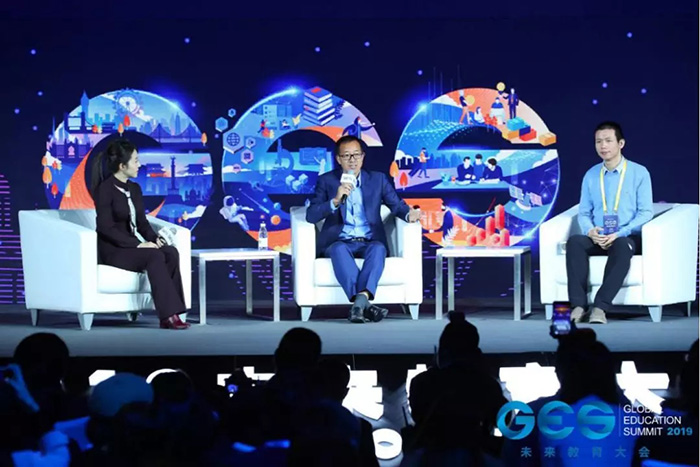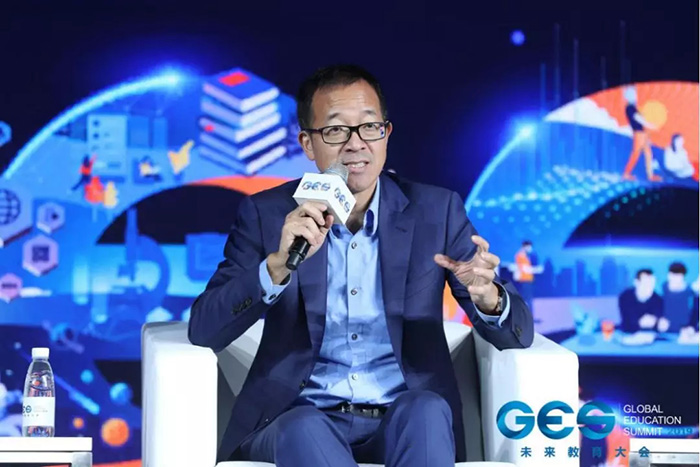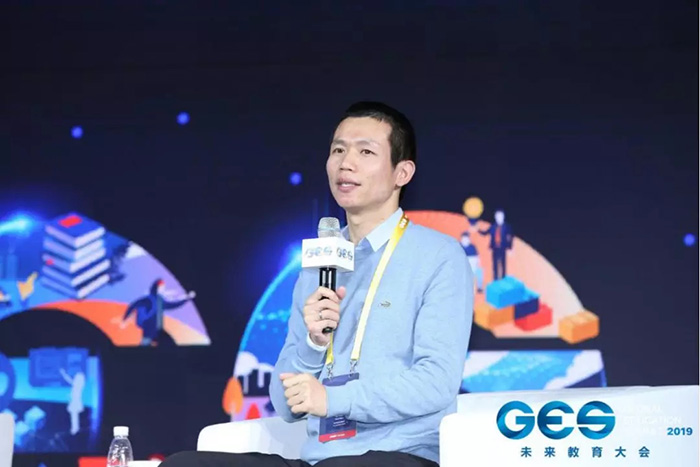




On November 25th, GES 2019 Future Education Conference, jointly organized by China Development Research Foundation, Beijing Normal University, Tencent, GSV (Global Silicon Valley Investment Company), New Oriental, and TAL Education Group, was held in Beijing with great fanfare.
On the first day, New Oriental founder Yu Minhong and TAL Education Group co-founder and CEO Zhang Bangxin once again started the "New and Good Dialogue". They discussed education and public welfare, education and technology, education and social responsibility, as well as the relationship between the two parties under the theme of "The warmth of education". One person is imaginative and humorous; the other is logical and rigorous. The personalities of the two were distinct during the dialogue process.
In a conversation with the host Zhang Xiaonan, the two not only deeply elaborated on the significant meaning of technology in promoting educational progress and equality based on practical experience but also fully affirmed the important role of educational training in complementing public education and exploring educational models. They also reiterated the behavior guidelines of "friendly competition and sincere cooperation".
They hope that New Oriental and TAL Education Group can continue to demonstrate their superb capabilities in the field of private education, promote the industry's adherence to the essence and laws of education, shoulder more social responsibilities, and achieve healthy and standardized industry development.

"New and Good Dialogue" on the spot
"New and Good Dialogue" originates from public welfare
In 2017, at the first GES Future Education Conference, Yu Minhong and Zhang Bangxin held a conversation for the first time. In their dialogue that year, they not only advocated for the establishment of "friendly competition and sincere cooperation" behavior norms in the private education industry but also announced a joint investment of 100 million yuan to establish the "Qingxi Yuanshan Public Welfare Foundation", which aims to create an industry education public welfare platform that promotes education balance through technology.
After two years of development, the Qingxi Yuanshan Public Welfare Foundation has gathered fifteen companies in the industry and has achieved initial results in educational public welfare. The foundation uses the dual-teacher live broadcast technology developed by New Oriental and TAL Education Group to deliver high-quality educational resources to schools in remote and impoverished areas, bridging the gap in rural education resources.
"The Qingxi Yuanshan Public Welfare Foundation was born out of a conversation over coffee between the two of us, discussing how we could better help children in impoverished areas. We thought of pooling together the high-quality resources of both parties to establish a public welfare foundation, and create a system for cooperation among private organizations to use technology to help education in impoverished areas," said Yu Minhong at the event. The foundation has already helped more than 100,000 rural students, and through systematic training for high school students, it has increased the college entrance examination enrollment rate by about 20%. "Our goal is simple, we hope to benefit more than 2 million rural children in the future."

Yu Minhong, Chairman of New Oriental Education & Technology Group
Qingxi Yuanshan uses technology to promote educational balance at the right time
"Both Teacher Yu and I grew up in rural areas and belong to the generation for whom learning changed destiny, but why did we start doing this only in recent years?" Zhang Bangxin pondered on this point during the event. He emphasized that China has never lacked people who are willing to help children in poor mountainous areas, and to a certain extent, lacks the support of funds. However, there is a lack of effective means of connection and real methods that can truly help them.
Zhang Bangxin believes that it is the recent technological advancements that have made this tangible help possible, and its effectiveness can be verified - mere possibilities and immature methods of the past. He further explained that three prerequisites have made this assistance possible -
First is the educational division driven by technological progress. The previous division was mainly by subject, whereas the current dual-teacher classroom model has a principal teacher and a tutoring teacher, the latter possibly with even finer divisions. This division will push education to delve deeper into the field.
Second is the leverage and network effect of the internet. The leverage of the internet can enable a teacher to teach several thousand or even tens of thousands of students simultaneously, and the network effect can, to some extent, allow everyone in society to become a teacher and mobilize the teaching resources in the entire society.
Third is the combination of content and data, which leads to intelligence. This intelligent data can interact with students intelligently like a good teacher.
"This allows Qingxi Yuanshan to input excellent educational resources from big cities such as Beijing and Shanghai into remote mountainous areas, coupled with local tutoring teachers, to achieve a similar effect in local students' education to that in big cities. This is a change brought about by the internet, big data, AI, and other technologies in recent years, allowing this effectiveness to be possible," Zhang Bangxin elaborated. As an example, he mentioned that last year, half of the classes at a high school in Inner Mongolia used Qingxi Yuanshan's dual-teacher classroom, while the others didn't. In the end, the students in the former classes had their college entrance exam scores increased by more than 50 points, "Everyone was very excited."
At the same time, Yu Minhong also pointed out that the dual-teacher classroom can yield good results. Apart from offline teaching and supervision, another significant reason is precise teaching. Consequently, the dual-teacher classroom at Qingxi Yuanshan focuses on hierarchical content and teaching methods to stimulate students' interest and enhance learning efficiency.
Educational training should raise the level and shoulder more social responsibility
Charity is only one aspect of the education and training industry's social responsibility. When discussing the social responsibility of the education and training industry, Yu Minhong stated that the industry takes a diverse and dynamic form, meeting various educational needs of the people.
On one hand, it fills the gaps and supplements the public education system, helping students improve their grades and gain confidence through appropriate means. On the other hand, it is also an explorer and experimental field for the progress of education in China, especially in the exploration of the combination of education and technology, which can make up for the shortcomings of the public education system, such as lack of funds and inflexibility. The research findings such as content, tools, and systems can, in turn, help the public education system. These are the two things that the education and training system must do.
Zhang Bangxin agreed with Yu Minhong's viewpoint, and also pointed out that the education and training industry is actually a natural product of social development at this stage. Zhang Bangxin explained that people influenced by Chinese culture place special emphasis on nurturing the next generation and valuing the investment in education, which is why the education and training industry has developed. Currently, the demand for extracurricular tutoring teachers within the education and training industry, can provide employment for roughly 10 million people, many of whom are college students. Therefore, this industry has great value and contribution to society, and these teachers should not be overlooked by society.

Zhang Bangxin, founder and CEO of TAL Education Group
Of course, while making contributions to society, the education and training industry also has certain shortcomings. According to Yu Minhong, the industry needs to "raise an entire level". He believes that firstly, the level must be raised in terms of purpose. Yu Minhong pointed out that the ultimate purpose of education is to cultivate a complete individual. However, nowadays, there is too much capital involved in the education and training field, with strong utilitarianism, and education is even made into a quick and successful business model. This motivation violates the essence and laws of education. Secondly, the level of teaching research and teachers in the entire training field needs to be raised. Since the education field bears significant responsibility, poor teaching not only results in financial losses to parents, but also hinders students' learning and growth. Currently, the industry is regulated by the national education department, which essentially promotes the industry to embark on a path of healthy development.
Friendly competition, sincere cooperation, and contributing to China's education development together
At the end of the "dialogue," the host asked about their opinions on their relationship. Zhang Bangxin believes that the best way to compete is to learn from one's rivals. He specifically mentioned areas where New Oriental is worth learning from. First, among numerous organizations, New Oriental was the first to understand that the most important thing to teach students is not knowledge, but the motivation to learn; second, New Oriental was the first to understand that it is more important to teach students ideals or aspirations than knowledge. Good education is about imparting values and energy, not knowledge; third, New Oriental excels in many areas despite being a latecomer.
Yu Minhong then said that New Oriental and TAL Education Group are indeed like "feuding families," but "there is a Chinese saying that 'there is no reconciliation without a t meeting'. Between New Oriental and TAL Education Group, we have really formed a good situation of competition and cooperation." Yu Minhong admitted that without TAL Education Group, New Oriental couldn't have grown so big today; this is the effect of competition. He believes that friendly competition, sincere cooperation, remains the best interpretation of the relationship between the two companies.
"I just want to say that with such a competitive system in place, we can still form a strong joint force and learn from each other, and as long as we don't cross the line, in the end, we can jointly do something beneficial for the development of China's education. This is undoubtedly a good thing," Yu Minhong and Zhang Bangxin hope that New Oriental and TAL Education Group can continue to demonstrate their exemplary role in the private education sector, promote the healthy and orderly development of the industry, and eventually contribute to the progress of education in China and the comprehensive growth of children together.